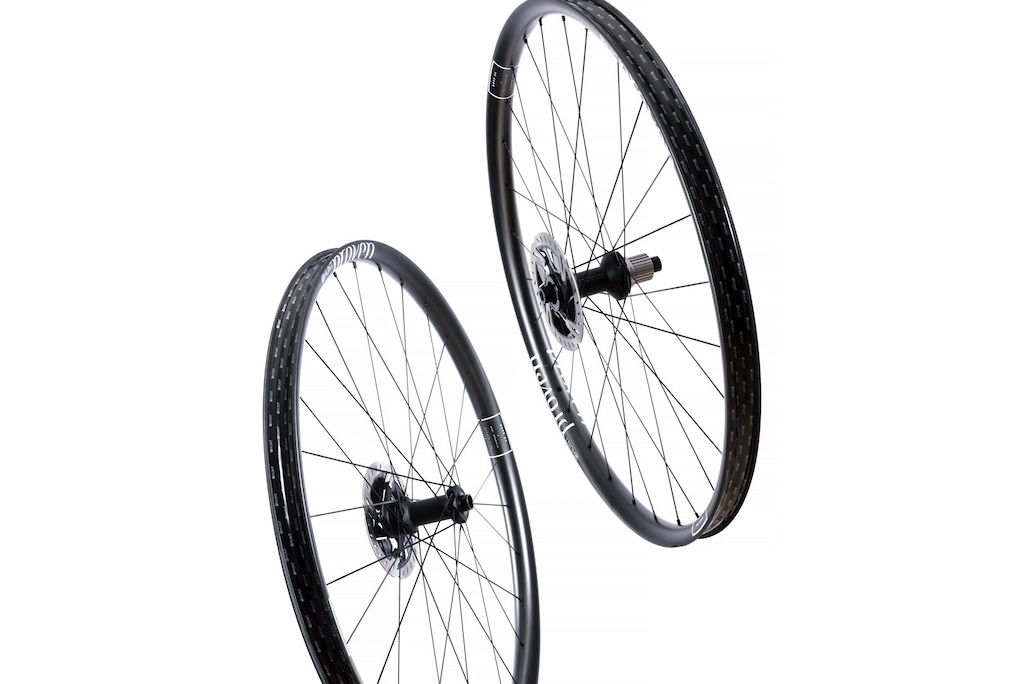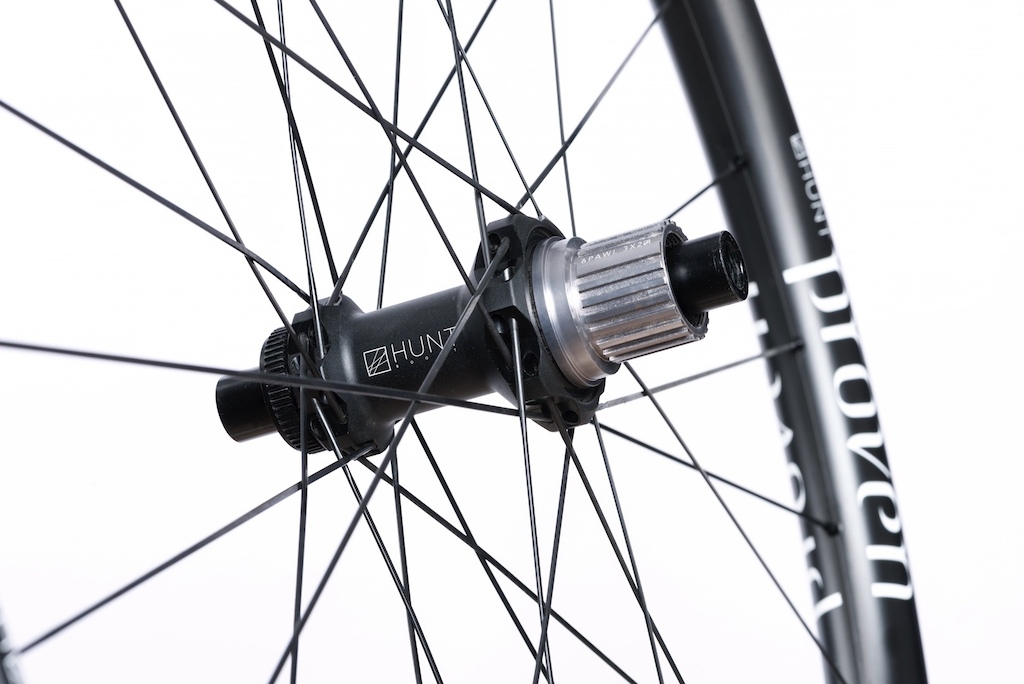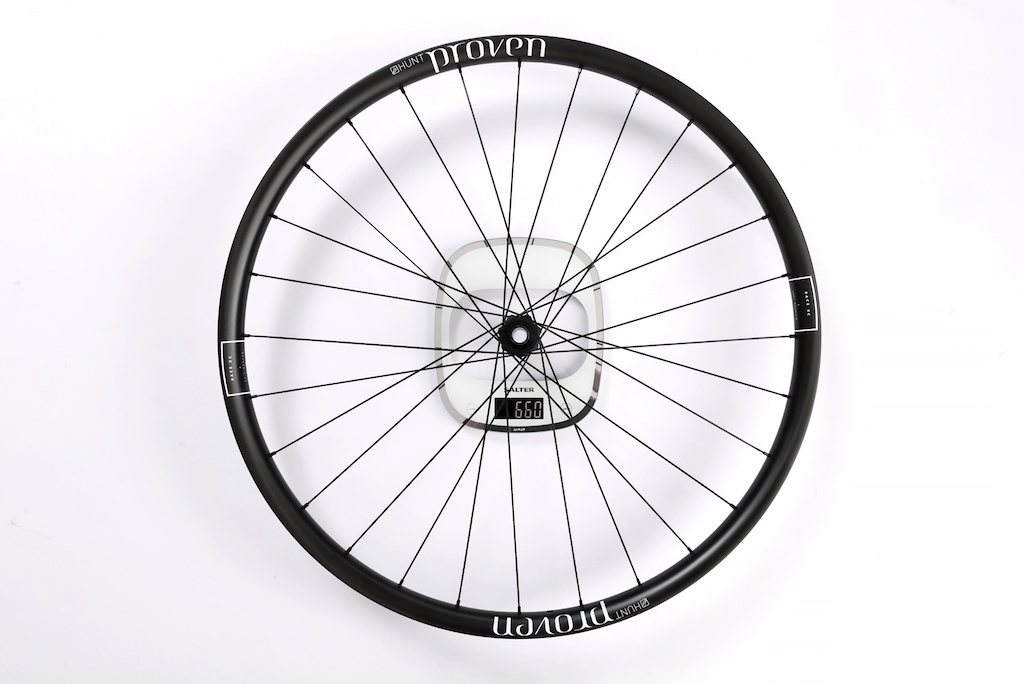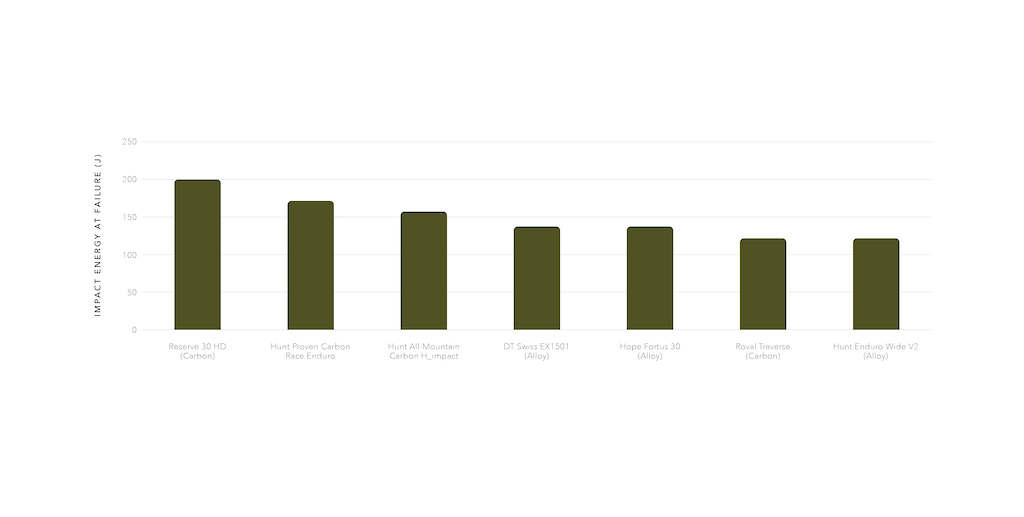Hunt Releases New 'Proven' XC & Enduro Carbon Wheels
Hunt have certainly been busy. The wheel manufacturer has in recent years transitioned into bike sales with the Privateer brand, sponsoring world tour road teams and now brings out their Proven models - their carbon rimmed, top tier off-road wheels.
The wheels have been in development for the past two seasons under Hunt's sponsored athletes, namely in XC and enduro. This isn't their first carbon wheelset - the Hunt All Mountain Carbon's are already in their range. Hunt say the Proven Carbon Range is an extension and continuation of all the lessons learned from the All Mountain model. Through those lessons, combined with impact testing, riding and deflection measurements, they realised it would be advantageous to offer a rim that was more tuned to suit specific disciplines.
There will be two models: the Proven Carbon Race XC and the Proven Carbon Race Enduro.
Proven Carbon Race XC
For any XC wheelset, low weight is going to be high on the list of demands. At 1469g, it's certainly relatively light. There are lighter wheels out there, for instance something like the Roval Control range. The SL, whilst weighing a mere 1240g and boasting a 29mm width rim, also costs a not inconsiderable $2650. The Control wheelset, which is the cheaper model in the range and whose weight is essentially on par with Hunt's Proven XC wheels, comes in cheaper at $1350.
For any XC wheelset, low weight is going to be high on the list of demands. At 1469g, it's certainly relatively light. There are lighter wheels out there, for instance something like the Roval Control range. The SL, whilst weighing a mere 1240g and boasting a 29mm width rim, also costs a not inconsiderable $2650. The Control wheelset, which is the cheaper model in the range and whose weight is essentially on par with Hunt's Proven XC wheels, comes in cheaper at $1350.
Proven Carbon Race XC Details
• 30mm internal rim width
• 22mm rim depth
• For cross country riding and racing
• 5-degree hub engagement
• 1469g a pair
• £899 / $1099 USD / €1169 per wheelset
• Pre-sale begins 30th September 2022
• 30mm internal rim width
• 22mm rim depth
• For cross country riding and racing
• 5-degree hub engagement
• 1469g a pair
• £899 / $1099 USD / €1169 per wheelset
• Pre-sale begins 30th September 2022
Another comparison could be the 24mm rim width E13 XCX Race carbon wheels weigh 1350g. However, the Hunt's rim is wider. Significantly wider, in fact. The 30mm internal width makes the claimed weight look better still.
Before getting onto what we know the benefits can be with a rider rim profile, a wider rim can also cause the tire to deform less during high cornering loads. This becomes even more relevant when you're running lightweight tires that might not offer that much sidewall support to begin with. Hunt also make the normal claims of offering compliance, damping, control and strength. Compliance and damping are the two that interest me the most, personally, even if only because new product releases are usually with fanfare of stiffness, stiffness, stiffness. Whether these wheels do offer a good level of those attributes is yet to be decided, however it is great to see the industry moving away from a fascination with carbon wheels having to be as stiff as possible.
The slimmed down hubs are Centerlock only, which probably won't put off the dedicated XC crowd too much.
Despite being called XC, there seems to be an acknowledgment from Hunt that what XC is is changing, even if sometimes our attitudes are perhaps slower on the uptake. In 2022, XC is changed. Full suspension bikes are more common, if not universally adopted and we're seeing bikes with longer travel. 120mm for a World Cup race bike would have been unthinkable a few years ago but now more travel and decent geometry mean there are plenty of lightweight fast bikes that are also plenty of fun, too. The Carbon Race XC's are built with this new wave in mind, it would appear, and Hunt say the wheels were built for "lightweight XC bikes with up to 120mm of travel". Somebody, wrestle Levy off his gravel bike and tell him to turn off the Tom DeLonge - he's got some downcountryering to do.
As stated, the rims use a 30mm internal width, which is combined with a rim depth of 22mm. While the claimed benefits are harder to perceive than rim width, or measure the real life implications on the trail, shallower rims can offer a high level of flex, and therefore compliance, than rims with a deeper profile. It also plays into low weight. However, it is something of a balancing act with impact resistance.
The kitchen scales are a welcome addition to a press release.
The wheels use triple-butted Pillar 1420 bladed straight pull spokes and are laced to CNC machined hubs that use dual sealed Revo bearings and feature 5-degree hub engagement. Centerlock disc mounts will also satisfy those wanting to get their rotors off in a jiffy.
Proven Carbon Race XC Competitor Impact Testing
Regarding their in-house testing, Hunt had this to say "Testing is something we take very seriously here at HUNT and having 24/7 access to our new engineering facility and custom impact test rig ensures we are 100% confident that each new HUNT wheelset meets our high standards. The graph below shows the impact test results of Proven Carbon Race XC and leading competitors. The graph below shows the impact energy (J) recorded at the first sign of failure."
They also include a note, further explaining "If we were unlimited in our budgets we would ideally have tested 3-5 of every competitor wheel. So please note this result may not be repeated with other rims of that brand/model." They released similar data for their Trail and Enduro Wide wheels. For more information on their impact tester, you can see pictures from an insert test they let me conduct at their facility. While their data is useful, it's probably worth taking with a pinch of salt, if only because other brands don't release their own findings. It's not to say Hunt shouldn't, but rather it would be nice if everyone did.
Proven Carbon Race Enduro
While the XC wheels have a uniform rim front and rear, the Proven Carbon Race Enduro wheels have different front and rear rims and spoke gauges. I know this might seem a bit intimidating if you're somebody who's worried about cross-compatibility or the ease of finding spares, but this approach does make a certain amount of sense. I imagine we'll see more brands doing this in the future - there are some that already do.
While the XC wheels have a uniform rim front and rear, the Proven Carbon Race Enduro wheels have different front and rear rims and spoke gauges. I know this might seem a bit intimidating if you're somebody who's worried about cross-compatibility or the ease of finding spares, but this approach does make a certain amount of sense. I imagine we'll see more brands doing this in the future - there are some that already do.
Proven Carbon Race Enduro Details
• 30mm internal rim width
• Front & rear specific layups
• Oversized 7075 T6 rear axle
• 5-degree hub engagement
• 1920g a pair (29")
• £899 / $1099 USD / €1169 per wheelset
• Pre-sale begins 30th September 2022
• 30mm internal rim width
• Front & rear specific layups
• Oversized 7075 T6 rear axle
• 5-degree hub engagement
• 1920g a pair (29")
• £899 / $1099 USD / €1169 per wheelset
• Pre-sale begins 30th September 2022
The enduro wheels weigh less than 2000g, which is impressive for a wheelset that can handle EWS-levels of punishment. Hunt also claim that their wheels aim to deliver "accuracy, comfort and strength". Accuracy and comfort suggest something that has compliance at its core. Of course, stiffness is something of a balancing act. While high amounts of stiffness are easy to conflate with precision, sometimes a wheel with a bit more give with deflect less and reduce the chance of high-frequency compression pushing the rider off their line.
I imagine this is where having different carbon tunes comes in. For me, my personal preference would be to have something more complaint and elastic on the front, where less of my mass sits, and something both laterally and vertically stiffer on the rear to ward off unwanted flex when driving through the rear of the bike. Of course, we don't want something too flexible on the rear and it will always be a compromise. Hunt reference this and say they wanted to make a front wheel that's accurate for last-minute direction changes but also a wheel that tracks well. They also claim this approach can reduce fatigue and aid comfort.
30mm rims and an oversized rear axle aims to keep enduro riders happy.
Both front and rear Race Enduro rims feature the same 23mm depth and 30mm internal rim width, with Hunt claiming their engineering team has "Manipulated the construction and carbon layup of each to offer tailored handling characteristics". The tougher rear construction adds 61g to the overall rim weight and offers greater strength.
Again, the wheels use Pillar triple butted spokes. There are TB2016 spokes upfront and Pillar TB2018 in the rear. The more extreme butt on the front wheel's spokes should offer more compliance, and the thicker 1.8mm butt on the rear should offer more stiffness. It might seem relatively marginal but how the hub receives information from the rim is all down to the spokes and small changes like spoke gauge can make a real and tangible difference.
Again, the hubs feature Hunt's own CNC machined hubs featuring heat-treated axles, dual-sealed, replaceable Revo bearings and your choice of freehub. Race Enduro will be available in Boost and Super Boost hub spacings, and offered in 29", 27.5", and mixed options.
Proven Carbon Race Enduro Competitor Impact Testing
The graph above shows the impact energy (J) recorded at the first sign of failure. Hunt claim their Proven Race Enduro exhibits an impact strength 12J greater than that of the Hunt All-Mountain Carbon H_Impact wheelset.
All Proven carbon wheelsets ship with Hunt's lifetime crash replacement warranty for the original purchaser, and covers you against accidents and mishaps. Pre-orders available from September 30th. For more information visit huntbikewheels.cc
Author Info:
Must Read This Week













$1,750
External Nipples
US Made (including layup & build)
I9 1/1 hubs
30mm internal width
1870 grams (29er)
It seems some of the comments above are incorrect or exaggerated.
Urgh, if we really must play that game;
ENVE M6 (from your Enve website)
• Application: Trail/Cross Country
• Inner Rim Width: 30, 35, 40
• Lifetime Incident Protected
• Starting at $2,550
Comments above 100% accurate and not exaggerated.
Say hi to Sarah from me. ;-)
But I would like to clarify incorrect or misleading comments about a brand of wheels when people will accept those comments as truth.
Fact is, the wheel sets don’t “start at” $2,500. They “start at” $1,750.
They ARE available with external nipples (at the lower price point, even).
Based on enve claim, the ARE made in the US.
I will say some people tend to break rims easier than other due to riding still ie, smooth vs plow. For full transparency I’m the former rather than the later.
The question is-how much is a couple hundred gram weight savings worth??
They ride great, and I love the POE and sound of the hydra hub. I did manage to flat spot a rear rim, but I9 shipped me a replacement rim for like $55.
After a week of no info from Specialized, I decided that I needed a secondary (cheap) wheelset just to get me back on the trail. Upon much browsing, I decided on the HUNT Trail Wide 29 Wheelset, at a smidge below $500. I've been pleasantly surprised by how much I like the rear wheel and it's been handling the NE rocks like a champ.
Finally got word yesterday from the bike shop that my rear wheel is ready for pick-up, but they didn't tell me much of what was done (entirely new wheel or just a new rim?). Guess I'll find out this weekend.
Long story short, I really like the Roval Controls when they aren't cracked, but the Hunts are an incredible value, for at least the Trail Wides that I got.
I've personally seen just as many problems with DT hubs (worn ratchets, spun drive rings, busted springs) as any other type, so I'll go pawls with 5 degrees every time.
For a send-capable wheelset they’re light.
But-is 200g worth the cost??
"Prove until they shatter like glass. Like all carbon products do but everyone is in denial about it."
Dude do you have any idea how many planes, race cars, boats, space shuttle, architecture, etc etc etc outside the bicycle industry are built out of carbon? Yes I run carbon mtb wheels on my carbon mtb frame
“Wow, my aluminum wheels are lighter. What’s the point if they’re not lighter” Despite the well known facts that weight is only one of the potential* upsides to carbon, not the only
“They’re too expensive! Why would I buy alloy carbon when I can by alloy for half the cost”
A. Don’t buy them then… and despite the fact that, aside from the upfront initial cost. that long term (especially with the warranties most manufacturers are offering) is cheaper and requires less maintenance (little to no truing); break a $500 raceface arc 30 wheel; that’ll be $130 for a new rim, $50+ For new spokes and nipples + shop labour = likely $300 to get your wheel going again. Break a carbon wheel; get a new rim at no cost, $50+ for spokes/nipples and labour; well under $200 (or maybe you’ll get an entire wheel replaced $0).
As someone who runs both alloy & carbon, the fact that people complain on every wheel article with the same comments is hilarious. Just run what you like and don’t be a dick about it
I watched an Americas' Cup years ago, and the Japanese boat broke the boom. It was carbon fiber, and at the break it was basically 2 gigantic serrated blades threatening the crew with imminent julienning. The tech has improved greatly, but if it's always struggling to attain a property that is inherent in another material, the other perks have to balance that.
I'll take my DT alloy wheels that are cheaper and lighter.
Quit trying to sound like Hugh Grant, eh?!
Or was it meant to tempt me into spending a stack more on carbon rims?
Proven: People will buy heavy carbon rims with mediocre hubs at a premium - YAY
Hunt for profit is on.
I weigh 190 lbs, am generally fast, and ride all-mountain/enduro type trails regularly. I have personally flatted or taco'd at least 6-7 rims since 2008, and only one was the result of user error. I'm not saying carbon never fails - but in general carbon is both more robust and has a much higher fatigue life than aluminum. Aluminum rims are pretty easy to dent and flat-spot, whereas carbon generally holds true and round.
Also. I've ridden with some highly talented riders. I literally cannot remember any time on a ride or race when any of them broke a rim. Carbon ones I certainly have!!
Nobody cares that you're "rocking the boat", we're responding because you're full of it. None of us are getting money from Big Carbon.
I was going through 2/3 alloy rims minimum per year, switched to carbon, and have yet to write off a single one. You'll notice you're downvoted to the bottom of the page, if we're counting anecdotes for anecdotes, those downvotes are more of them disagreeing with you.
Carbon is vastly stronger in impact. It isn't a debate, it's a known fact. I heavily doubt your family member, to say the least, and moreso feel you're making it up for some weird political point you're trying to get to.
Carbon Stanchions
Carbon Spokes
Carbon Pedal Spindles
Carbon Bottom Bracket Spindle
Carbon Bolts
Carbon Bearings
Carbon Axles
Carbon Chain Rings
Carbon Cassette
Let me know I'm all ears?
You responded so quickly last time...
Stuck for words???
Spokes have been done by Scott recently. Carbon bolts are used in bikes now for low torque applications. Carbon chainrings are a thing. Someone did a cassette years ago, they do a crank spindle now.
Not sure why the hate on a material.
Again, I cannot fathom your experience. I ride with a fairly significant number of guys in the states, and aluminum rims are a part that routinely needs replacing within the riding group.
We know you can't. That's the point.
My anecdotes suggest carbon being vastly stronger. Lab data backs this. Prove the alternative.
You can't. When you figure this out, let us know.
Answer me this question. If carbon was stronger than steel.... Why do they not make carbon frames with a smaller diameter tubes than then steel frame tubes?
Can't wait for the answer on this!
The answer here is very simple; you're incorrect.
I can debate you on every point you bring up, but you're just going to jump to the next thing without acknowledging the last point. Get me the lab results. You're a moron spouting nonsense until you have something to back it up; which you lack.